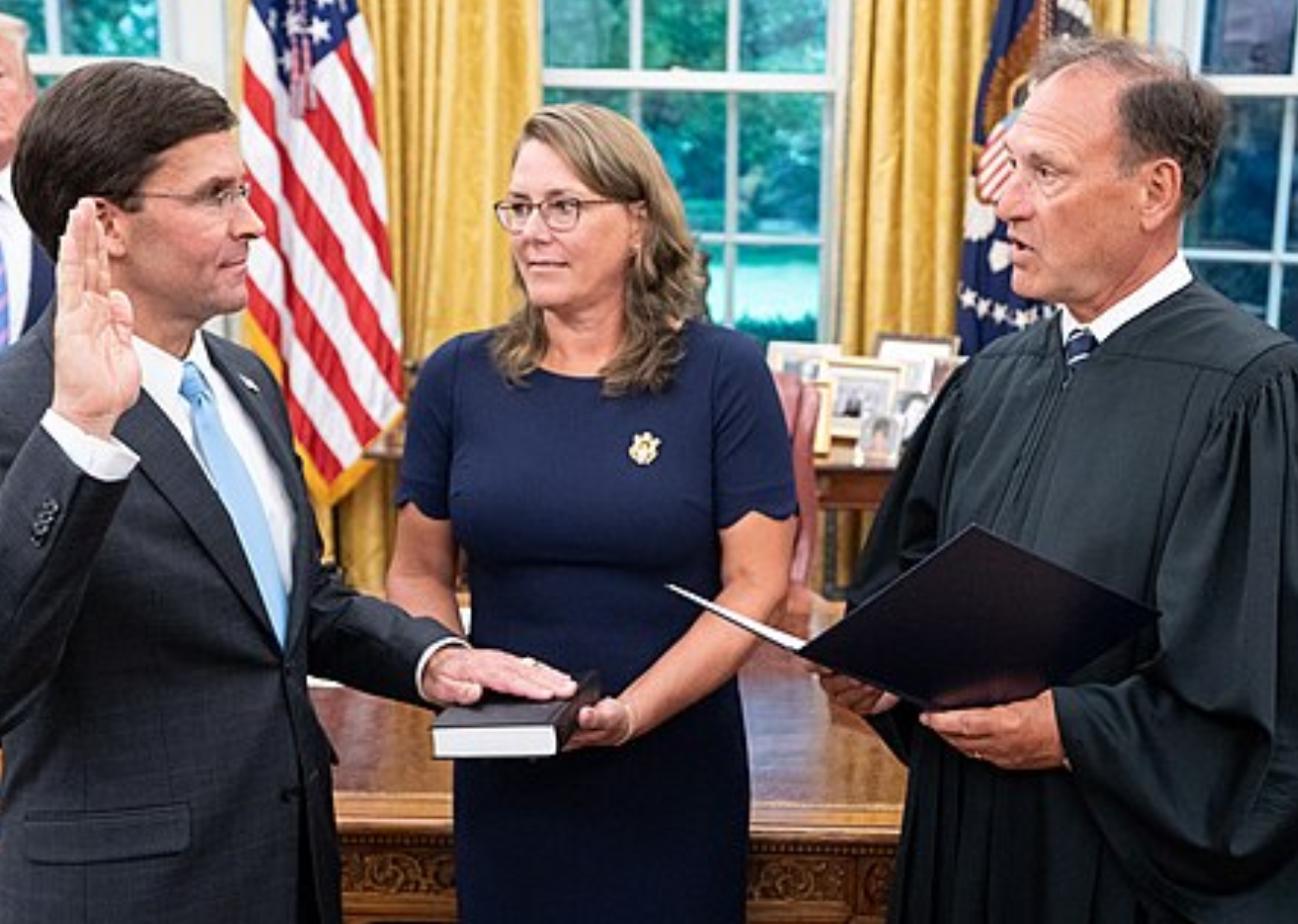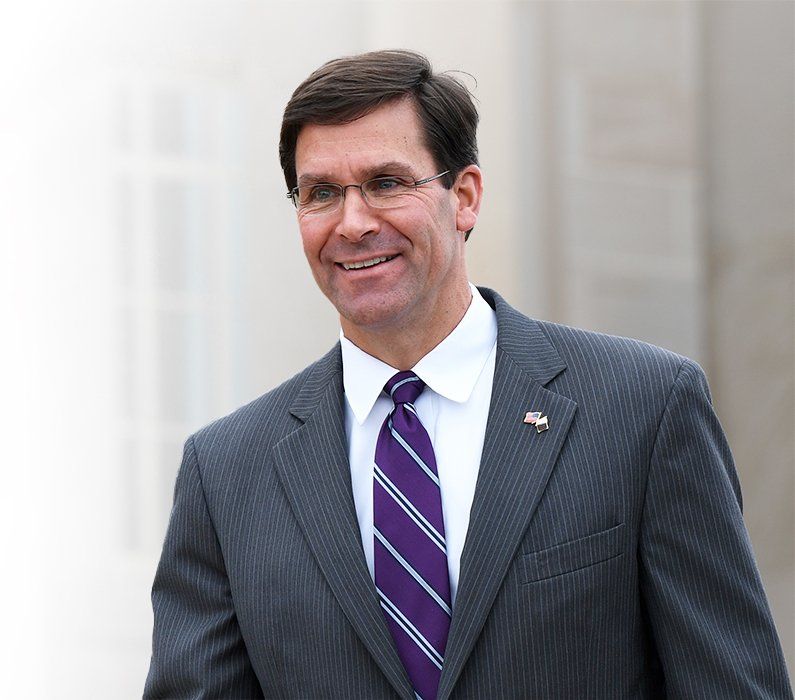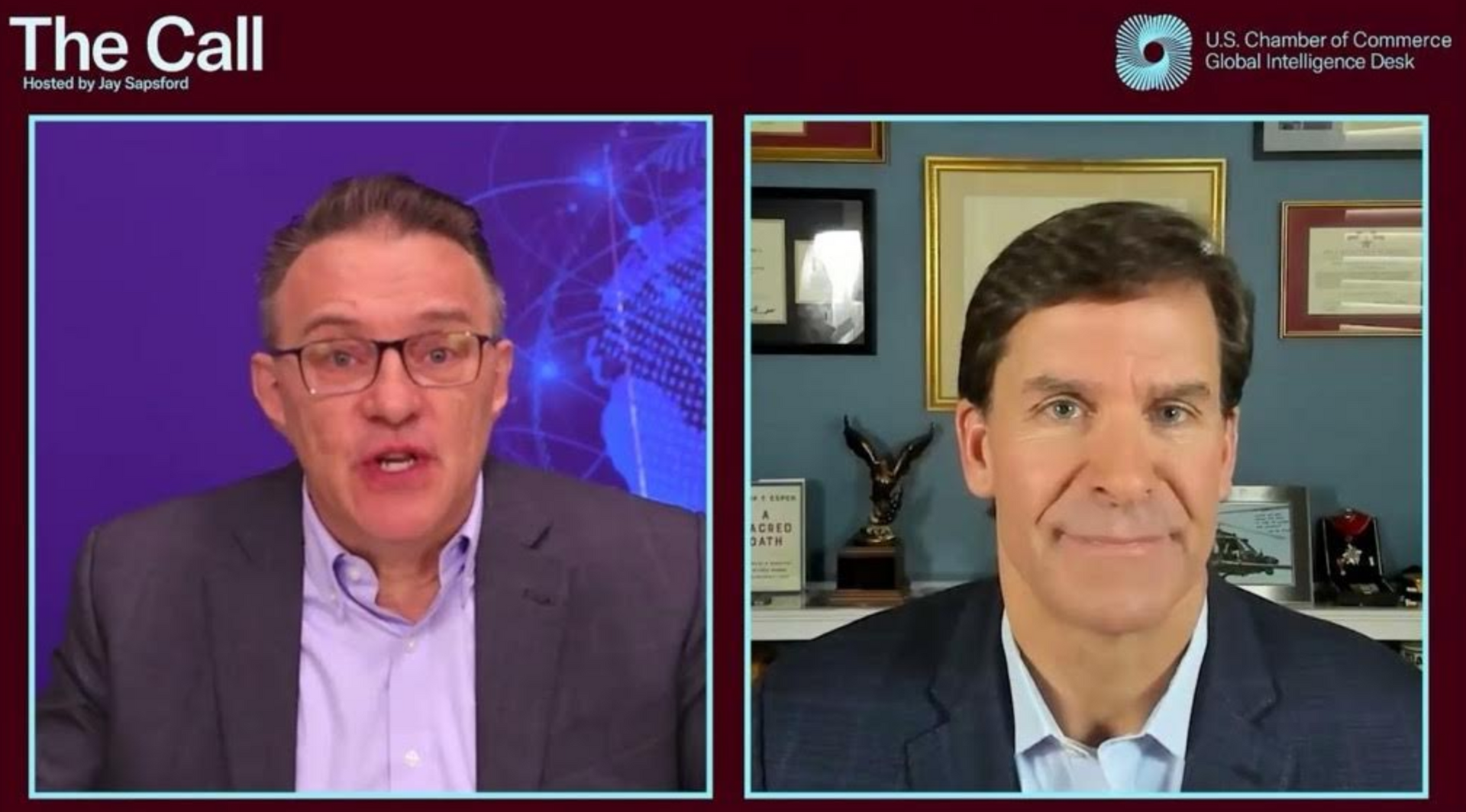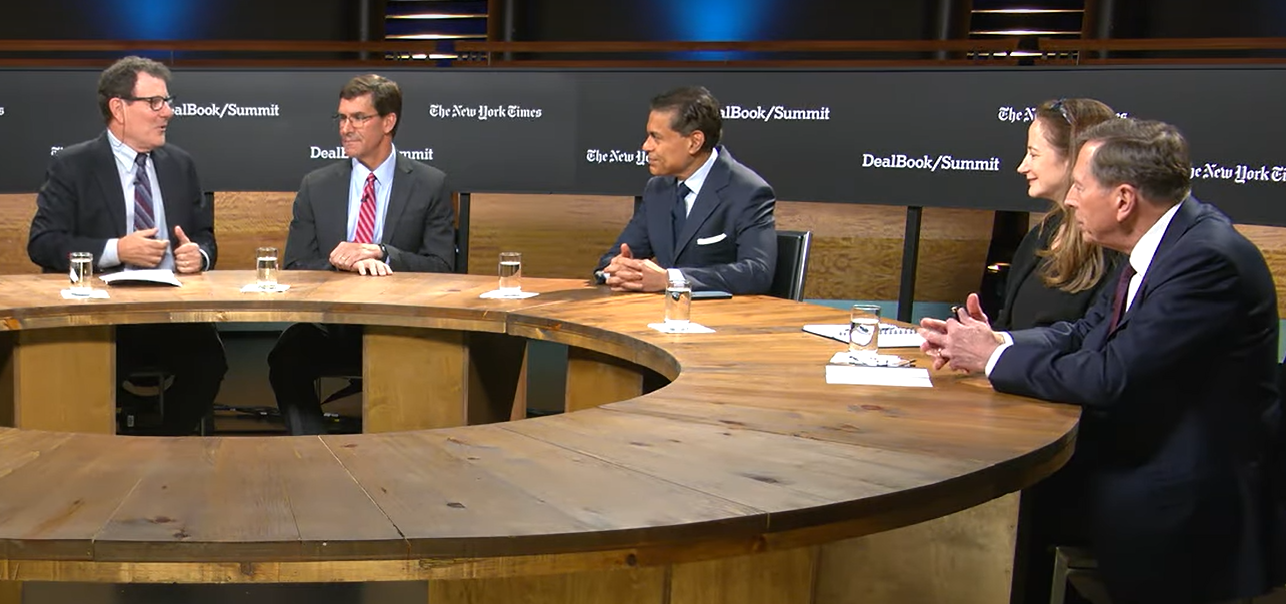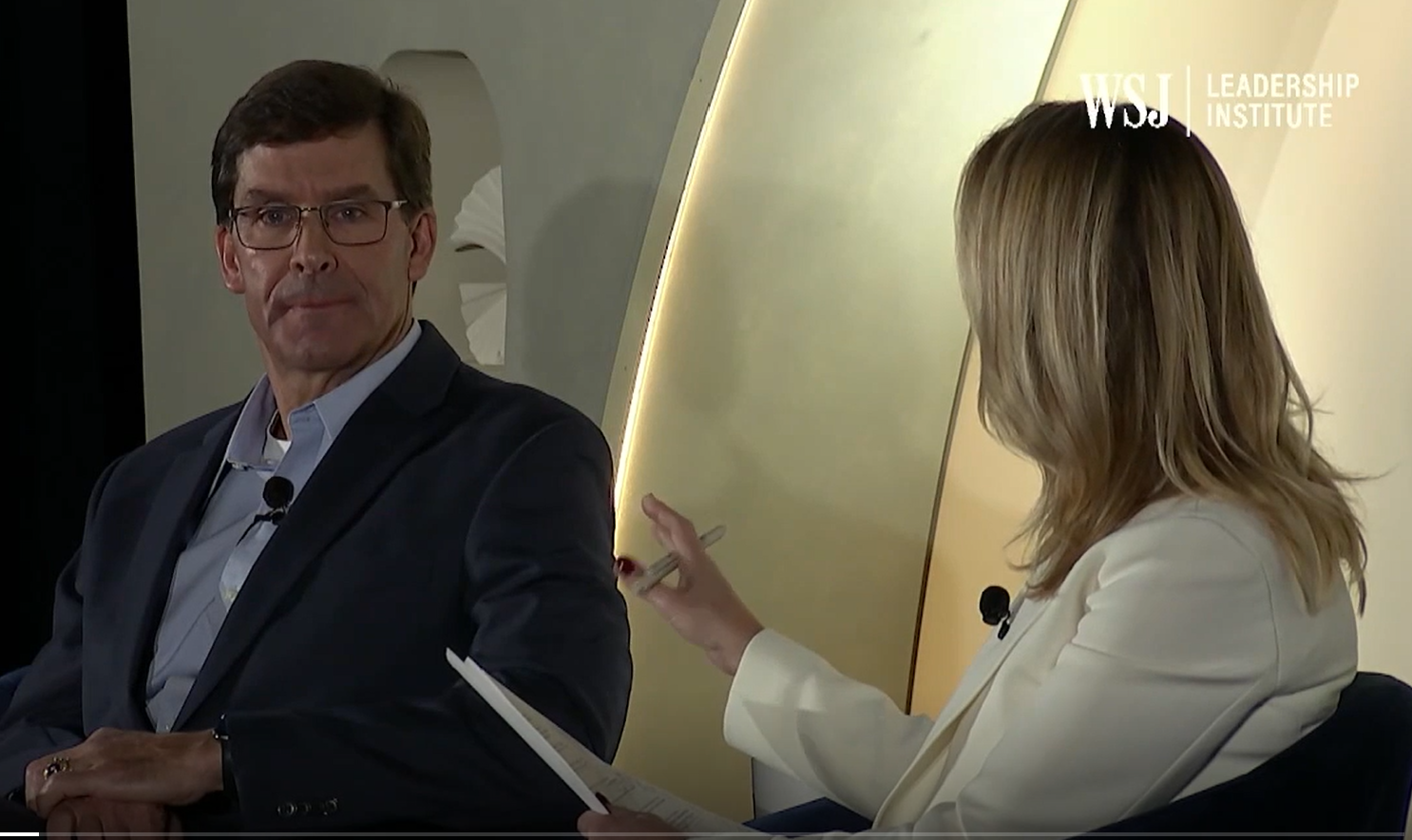Washington Post Magazine
Mark Esper on Trump: ‘There were a lot of bad ideas being proposed’
KK Ottesen Reporting for Washington Post Magazine
Mark T. Esper, 58, served in the Trump administration as secretary of defense from 2019 to 2020 and was secretary of the Army from 2017 to 2019. His book, “A Sacred Oath: Memoirs of a Secretary of Defense During Extraordinary Times,” was released in May.
You write in your memoir about several dramatic instances when you had misgivings based on differences with President Donald Trump. Was there a moment those came into stark relief for you?
My separation with Trump begins almost immediately, and I begin pushing back, and it grows and grows over time. But I think it all comes together on June 1st, [2020] in the Oval Office when he calls us all in to discuss the [George Floyd] protests in Washington, D.C., and wants 10,000 troops in the capital. The president is up and down out of his chair, red-faced, moving his arms around expressing things. He’s swearing at us. He’s calling us losers. He says, “We look weak. The country looks weak.” “We” means him. And we get to this point where he settles in his chair and the room gets a little quiet, and he leans in and looks at [chairman of the Joint Chiefs of Staff] General [Mark] Milley and says, “Can’t you just shoot them? Just shoot them in the legs or something?” And the question just hangs there. I think we were all taken aback. It’s just so far out of bounds. Nobody talks about shooting Americans.
Milley, [Attorney General Bill] Barr and I immediately go back to pushing back on this whole idea of bringing troops into the city in the first place. I’m pushing for law enforcement to be the lead. And Bill Barr’s supporting that. And we just kind of passed through that moment. And at the end of the day, because I think the president’s finally about ready to give a direct order to send troops into the city, Bill Barr commits to put 5,000 law enforcement in the streets. I commit to get up to 5,000 National Guardsmen into the city to do the job. And to really prevent the president from giving an order, I say, “Look, I’ll bring troops into Fort Belvoir,” somewhere close to the city. It wasn’t getting what he wanted, but it was enough to get him to yield. That was kind of my sleight of hand to get us out of the room, off the topic, and moving forward before we got this disastrous order.
So that was a turning point for you, that day?
Yeah. And then of course, the walk across Lafayette Park. I was heading down to the FBI command post for the evening. And I get the call around 6:20 that the president wants an update on the plans for the evening with regard to troops and law enforcement. But as I enter the outer Oval, there’s a couple dozen people there, and I say, “Hey, where’s the meeting?” They say, “The meeting’s off.” I say, “Well, I’m going back out.” And they said, “No, no, no, the president wants to walk across the park, and go check out the damage to the church.”
Did your radar go off then?
No, shame on us. I talked to Milley — “What’s going on?” And he doesn’t know. And as I approached the president up on the portico, I think I say, “Mr. President, where are we going? What are we doing?” He just kind of turns says, “Come on.” And he starts walking. We walk down this kind of gravel path, and as you leave the White House grounds you make a right turn, and right there as we make the right turn, White House press staff, or somebody, says, “Give the president distance between you and him.” And we rounded the corner, and you can see the reporters, just throngs of reporters. And right then and there, Milley and I realized that we’ve been duped, and we’re caught in this moment and can’t escape now. And the rest is history.
Later that night, Milley and I take this long, private walk along down the reflecting pool toward the Lincoln Memorial and finally have a chance to talk and share what’s going through our heads. We come to this point where we realize that our political antenna aren’t nearly calibrated the way we need to be; we made mistakes, and the game had changed, or at least our realization of it. And we need to come up with — at least I did — a different game plan going forward.
One thing I was struck by is just how much time and energy you spent forestalling a direct order from President Trump to use military force, whether to shoot missiles at Mexico or Iran or to shoot protesters. And while some called you the derogatory nickname, “Yesper,” you explain working behind the scenes to avoid those direct orders and to talk him down.
Look, in some ways I didn’t treat President Trump any differently than I’ve treated any other boss. My view was I owe them my honest advice. And I owe them more options than what they’re presented. And so in some cases I pushed back: “Mr. President, you can’t shoot missiles into Mexico — it would be an act of war, be illegal and ruin our relationship.” So in that scenario, I’m pushing back, but then saying, “But I understand what you want to do.” Because he was serious about taking care of drugs in America; we all know it tears up communities and families. And so I felt that I owed him another idea or sets of ideas. And I said, “Look, if you want, I’ll go back, and we’ll see if we can come up with something.” So that’s what I would do. But his inclination was to use the military too often. And it was enabled by others around him in the White House, around the [National Security Council], who kind of kept pushing this use-of-force type of approach to solving problems.
Did your experience shape the way you think about whether the checks on executive power are adequate? And what happens in the case of a president who [may be] unfit?
Yeah, we saw what happened there in the end, right? I’m fired on November 9th. And not just me, but they come in and decapitate the Pentagon in terms of knocking out undersecretaries. And according to reporters I spoke to, within 48 hours the president calls a meeting to discuss a possible attack on Iran. And then there’s ordered the immediate redeployment of troops out of Somalia. I mean, all these things start happening, right? And part of this was not just who would come in behind me, but how much time would they have? And so my goal became to get to the election because I think the American people should decide these things. And what I didn’t want is somebody having eight months to do Trump’s bidding and, maybe, create an October surprise. Or Lord knows do what else.
Anyway, on the checks and balances thing, the American people decide who they want. But the question would be: Is there another role for the Senate in terms of approving nominees? People have asked me, “Well, if Trump is reelected, what does that mean?” I think that one of the lessons that he and those around him will not make again is that they will make sure that they really get their loyalists into position. They’re not going to pick another [Jim] Mattis or another Esper. They’re going to get somebody in that’s going to do what he wants. And that’s where the Senate has to be really scrutinizing who comes into the administration. And, by the way, this could be a future Democrat one as well. You need good people to serve. You need good people who understand that their oath is to the Constitution, not to the president, not to the party, and not to a philosophy, and not to some notion of the election being stolen. Their oath is to the Constitution.
A lot people who read a book like this by people who come out of an administration and then criticize it ask, “Why did you wait?”
A big part of this book is the ethical dilemma I wrestled with: Should I stay or should I go? What’s your oath and who’s your loyalty to and what’s the better course of action? My view was that given the singular important position I sat in — there are only two jobs in the United States that can deploy U.S. military, and that’s the president and secretary of defense — that my higher calling, my duty, my oath was to stay in that position and prevent bad things from happening. Because there were a lot of bad ideas being proposed. And by the way, while I was there, I could do good things in terms of building cyber capabilities, modernizing the military, taking care of [military] family members, et cetera, et cetera.
Look, I could’ve resigned. I would’ve been the hero for 48 hours. But I think I couldn’t have lived with myself. If we’d attacked Venezuela or gotten in a war with Iran, I probably would have thought, “Could I have been there to make a difference? Why did I leave? I could have stopped that.”
I got to tell you, KK, even though folks on the left are criticizing me right now — “Why didn’t you resign on the spot? Why didn’t you walk away?” — I feel more confident today about [staying] than I did at the time, because I just look at all the good things I was able to advance in the Pentagon. And all the bad things I was able to push off. And what happened after I was removed and my chain of command replaced demonstrates that. I just can’t imagine what would’ve happened if I’d walked away on June 1st or June 2nd or was fired on June 3rd — the team he would’ve put in, what would they have done for six, seven, eight months. That was the thinking I was going through in my mind. And I called up my predecessors, I called up Colin Powell, all these folks, and sought their advice because I was unsure. And to a person, they said, “No, you got to stay. Make him fire you.”
And in some ways, I have those misgivings about being fired. If I’d been there on January 3rd, or 4th, or 5th might I have foreseen what was going to happen? Could I have mobilized the Guard, so they could have been in a better position to deploy more quickly to help the Capitol? I mean, you have those thoughts.
What would you like your legacy to be as a secretary of defense in this tumultuous period?
I’d like to think with regard to the military that I made a lot of good advances in terms of implementing the national defense strategy, and retooling and reorganizing our military to deal with the Chinese in the 21st century. I hope that’ll be the major achievement of my tenure on the positive side of things, the traditional side of things, if you will. Number 2, I think the work we did alongside [the Department of Health and Human Services] with Operation Warp Speed changed the arc of the nation and how it dealt with the pandemic. I think we saved a lot of lives. I think we rescued the economy. That’s a “we”; it’s a team effort. I think people might hopefully remember that piece of it.
In terms of managing the White House and stuff like that, look, people are going to say, and I say in the book, I made mistakes. I own up to them. But I think I did some things right. And at the end of the day, when the rubber really hits the road, when the moment counted, I hope people will say that he stood up and did the right thing. He went before the public on June 3rd and mourned the tragic murder of George Floyd, spoke about the apolitical role the military holds in our society, and announced that he would not support invocation of the Insurrection Act. And I hope they would say, as I believe, that this is what kind of calmed things down; this is what made the republic less wobbly and avoided what could have been a really bad situation. I hope that’s what they say.
This interview has been edited and condensed. KK Ottesen is a regular contributor to the Magazine.
